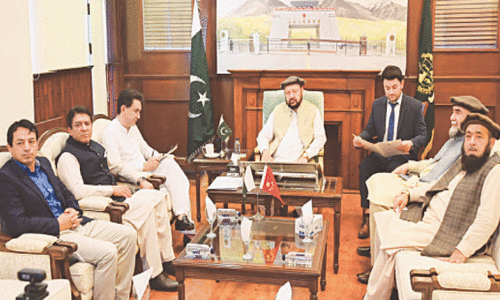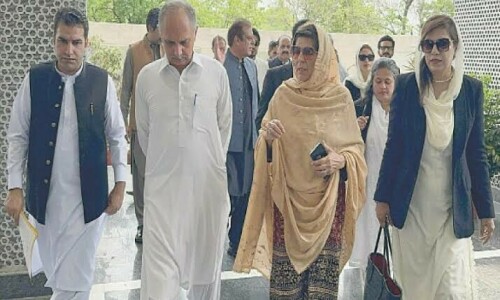HYDERABAD, Sept 3: The Sindh Abadgar Board has said that increase in prices of oil will have a devastating effect on the country’s economy and 90 per cent brunt will be borne by the agriculture sector.
The working committee of the board which met here on Saturday said it was due to wrong policies of the government that the country was forced to import wheat, sugar, potatoes, pulses, onion, edible oil, dry milk and even meat and spices.
Abdul Majeed Nizamani presided over the meeting.
The meeting demanded that the price of oil should be separately fixed for the agriculture sector twice a year on April 1 and October 1 for Kharif and Rabi crops respectively and the government should itself evolve mechanism in this regard.
It demanded that the transport system of trailers which was introduced at the behest of a very strong lobby be ended and the railway system with reduction of 70 per cent cargo charges be introduced.
It called upon the government to introduce uniform rates for chemical fertilizers and seeds in the country.
It urged the government that on the pattern of Punjab, power connections for tube-wells and lift pumps on basis of D-meters be provided free of charge.
The meeting criticized silence of the Sindh government on malpractices of cotton ginning factories with regards to prices of cotton and deduction of two kilos of cotton on 40 kgs.
The meeting took strong exception to refusal of the Trading Corporation of Pakistan to purchase cotton.
It demanded that the government should ensure implementation of decisions which were recently taken at the joint meeting of the Sindh government representatives, the TCP, Sindh Abadgar Board, Sindh Chamber of Agriculture and Cotton Ginners Association.
The meeting reminded the Sindh government that it was unequivocally decided that no deduction would be made from cotton supplied to ginning factories and that if rates were reduced as per the government fixed price of Rs975 for 40 kgs, then the TCP would step in and purchase cotton.
It expressed surprise over disinterest of the government to conduct research on agriculture and optimum use of water.
It wondered that when small growers like Siddique Bukhari and Imdad Nizamani could prepare hybrid seed through research, why the government could not make any breakthrough in the area during the last 58 years.
It reminded the government that India, Iran, Turkey, China and Israel were far ahead in agriculture research and they were harvesting rain water on roofs.
It demanded that the government should allocate at least 1.5 per cent of gross domestic products for agriculture research.
The meeting observed that the agriculture sector was all but destroyed due to indiscriminate import of sugar and cotton.
It regretted that the government was pursuing the policy and demanded that no agricultural commodity be imported at the time of harvesting of the crop.
It demanded that if the import become inevitable then the government must examine its existing stocks and make a correct assessment as to how much quantity should be imported.












































